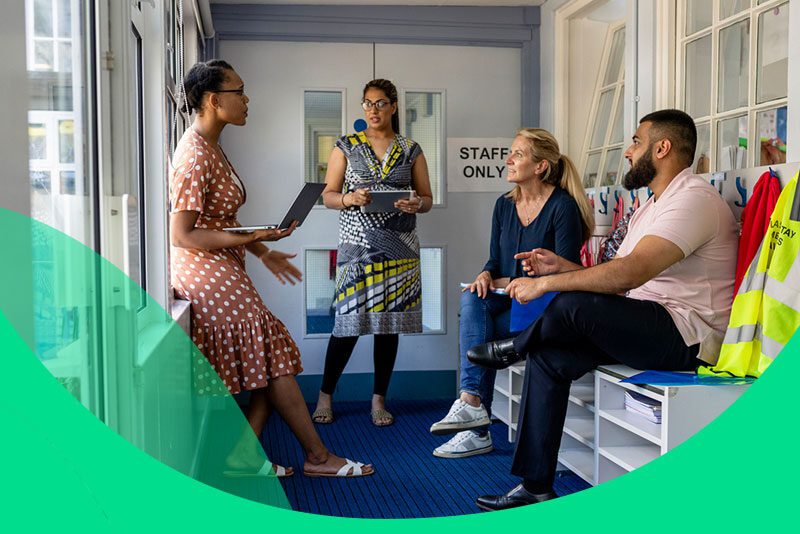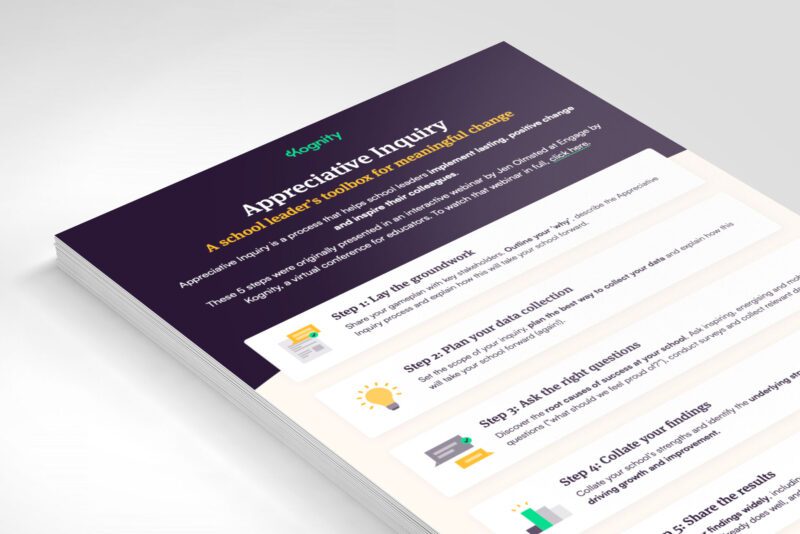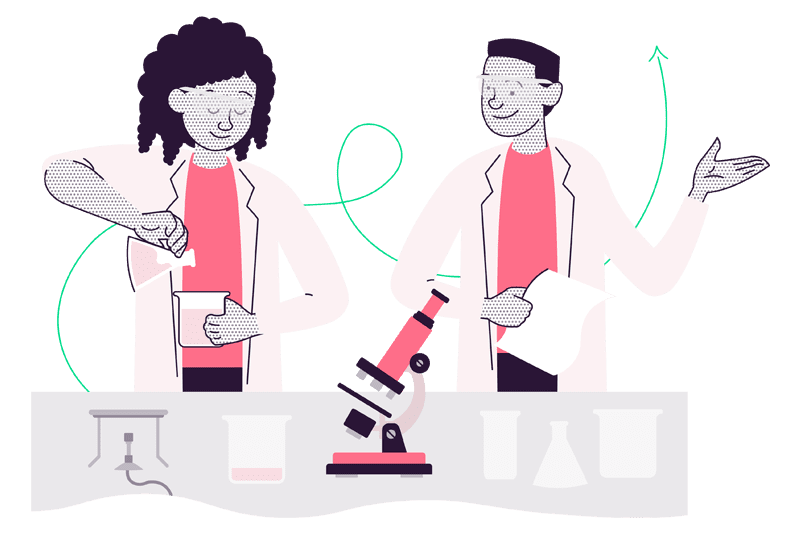Thoughts from an education entrepreneur: a chat with Hugo Wernhoff, Kognity Co-Founder and CEO
Kognity is a teaching and learning platform that puts high-quality, engage materials at educators’ — and students’ — fingertips. It’s transforming the way learners engage with interactive content and take ownership of their learning, and they can access Kognity anywhere, at any time, from any device. Entrepreneur Hugo Wernhoff is CEO and Co-Founder of Kognity, and we sat down with him to learn more.
- Hugo, what is the “origin story” of Kognity?
I come from a family of teachers. My mother and grandmother were both educators, and they have been major role models in my life. Education is a career that always interested me. When I was in college, a friend and I launched a test-prep business, with centers in the US and in the Middle East. I think having that experience made us fall in love with the “business” of education. I especially liked meeting and working directly with the students who would come to our courses — developing a rapport and a relationship with them, caring about the outcomes we could provide them, and actually being able to deliver real educational value. It made my partner and me realize that this is what we wanted to do with our professional lives. This was — and still is — the inspiration behind Kognity, and behind me becoming an education entrepreneur.

- In what way is Kognity filling an “unmet need” in education?
Anyone who works in education knows that there are dozens of unmet needs, in spite of the often heroic efforts of administrators and educators. I’m talking about funding, equity, access… as well as a lack of time, appropriate tools, and resources. The latter is what we started focusing on from the start.
A great deal of magic happens in classrooms every day — but there aren’t all that many new tools and resources available. When we looked at the learning resources ecosystem, we realized that there was a lot of work being done in education technology, and then separately there was a good deal being done in the field of pedagogy by content and curriculum providers. But there weren’t many companies working at the intersection of both those things. And I think that’s where Kognity lives. It’s a merging of the two sides of the coin — the technology and the pedagogy — in a format that’s very user-centric. In other words, we didn’t want to be “just” an edtech company, or “just” a content and curriculum publisher — and so we became a marriage of both those things.
“We didn’t want to be ‘just’ an edtech company, or ‘just’ a content and curriculum publisher — and so we became a marriage of both those things.”
- In what other ways does Kognity represent a whole new approach?
There are many new things about Kognity, but the principal thing is that all teaching and learning needs are addressed in one place, in a curriculum-aligned teaching and learning pathway: textbooks, assessment, workbooks, workflows, analytics. It’s one central hub for all teaching and learning needs. This is unique.
Before Kognity, you tended to see products that would offer comprehensive solutions from a content point of view, but they lacked the ability to benchmark student progress in a simple and easily understood way. Kognity is all about simplifying the lives of both teachers and students, allowing learning to be accelerated in a whole new educational experience. The Kognity platform resolves a lot of pain and frustration for educators.
- How did the COVID-19 pandemic impact upon Kognity’s activities?
The ongoing rollout of Kognity during a pandemic was of course difficult. For teachers, the school shutdowns threw them into a new situation with very little preparation and asked them to operate in a new way. And it was also challenging for us as a company — we had to rethink the way we worked internally, with our teams spread out across the US and Europe, and with colleagues working in isolation at home.
At Kognity, we saw this as a chance to help schools and support educators even more. We managed to help out a lot of schools that had entered lockdown. We had an international user base in place and were able to offer support, starting immediately in January 2020 when the first schools started to close down in Asia. We helped teachers and students continue their teaching and learning, and as the pandemic spread across the world, we saw usage numbers go up.
Don’t get me wrong, Kognity isn’t necessarily built for remote learning; it sits at the center of learning in school buildings all over the world. But some educators found that the impact they got out of Kognity grew even bigger during the pandemic.
- What role did teacher feedback play in any pandemic-related product adaptations that Kognity made?
Kognity’s entire product development process, which involves about half the company in terms of headcount, is centered around us learning from teachers and from students. That’s always been a constant and ongoing process — both before and throughout the pandemic. We could no longer do site visits during COVID, of course, but we held regular calls with teachers. A different set of needs arose during the pandemic, and teachers started relying on Kognity more for synchronous teaching, as a tool during actual class time. That required different kinds of content, but the comprehensive approach that we had built leading up to the pandemic turned out to work really well in a remote teaching environment as well. The alterations we had to make to the product were not major — it was mainly a question of tweaking and repackaging from the user-experience point of view. We try to base everything we do on what we learn from educators, absolutely.
- Why did you focus on high school science as the first step into the US-specific market?
I’ve always felt that science deserves more attention in public discourse. Helping students to think more like scientists, to become critical thinkers, and to become “intellectual explorers” will have positive effects on them for the rest of their lives. So I’m a big fan of science teaching getting more attention generally.
But we mustn’t forget that literacy and math skills can be easily integrated into science teaching as well. In other words, learning science can be an integrated way of teaching literacy and math skills in a kind of “applied” sense — so it’s a very powerful place to start in terms of curriculum. Science education covers a lot more than just science!
In addition, when we started speaking with US educators, both at the district-administrator and the classroom level, we discovered that many felt science teaching had been underserved by education resources for a long time. So it just seemed logical to focus on phenomena-based science teaching, especially with the advent of the Next Generation Science Standards (NGSS).
“Literacy and math skills can be easily integrated into science teaching… in a kind of “applied” sense — so it’s a very powerful place to start in terms of curriculum. Science education covers a lot more than just science!”
- So how is Kognity different from other education platforms?
First, I’d say that Kognity is a more comprehensive, all-in-one platform providing not only the educational content but also the professional development teachers need. Secondly, other platforms simplify the logistics around teaching and learning, but they don’t provide the “meat” — the assessments with automated feedback and actionable data, the interactive flow of learning activities, videos and simulations… the things that actually create learning experiences. Those are things that teachers typically have to put together on their own, and this is especially relevant for NGSS.
There are so few resources available to support educators as they transition to the new standards, and developing these more phenomena-based activities on their own can be even more time-consuming. With Kognity, it’s all there. And yes, some publishers that have traditional textbook content try to add a digital layer, and they end up creating a kind of simple PDF version of a print textbook. Even if you can annotate and comment, that is still a passive learning experience. Importantly, most digital learning resources are built for logistics — handing in assignments, keeping report cards, tracking attendance — and not necessarily for maintaining the high level of pedagogy and interactivity that the NGSS requires.
- What is the student experience like with Kognity?
We spend a lot of time internally talking about the user’s experience of Kognity, which is very different from most learning resources and products. When a student logs on, they get an overview of the subject, so they get the entire curriculum laid out — everything they’re expected to know and learn. At any time, students can see exactly what they have and haven’t focused on, which are their strong areas and where they’re not quite as strong, so they can easily dive into the lessons and activities that are most relevant for them.
They’re not sitting and reading, they’re engaging in the content — experiencing simulations, watching videos, posing questions and receiving direct answers. They can challenge classmates in quiz battles. They can take notes and structure them in whatever way works for them. In all of this, Kognity is creating independent learners. The best thing is, we’ve found that teachers have extremely positive feelings about giving over this kind of autonomy to students. We very seldom come up against any defensiveness or resistance from educators.
- You’ve mentioned that a part of Kognity’s mission is to “give back” to schools. How so?
Today we work with schools in affluent areas as well as schools in underserved areas — the latter of which often face particular challenges, such as poverty and violence. We love the range of students we serve, and none of them are more important than any others. Everyone deserves a quality education. And a truly engaging learning experience can be a great tool not only for helping to inspire those students who may be less engaged, but also in serving as a social equalizer.
Kognity was founded with the ambition of creating a significant change in learning efficacy for all students in the world, all 1.5 billion, with more than half of those in India and sub-Saharan Africa. We go to those areas not because there’s a lot of commercial opportunity, but because we want a product that will make a real difference in the world. It’s all about giving kids the means to learn and thrive in society, providing opportunities to those individuals who don’t have opportunities right now.
- What are your thoughts on the current state of global education?
Education is a solution to many of the world’s biggest problems, including prejudice, conflicts, poverty, overpopulation, and climate change. It’s safe to say that education today isn’t going exactly where we want it to go. We will have 2.5 billion K–12 students over the next 15 years, and this will require the training of 70 million new teachers. Meanwhile, a recent survey in the UK showed that 70% of teachers today are considering leaving the profession. So, to put it bluntly, we have a $7 trillion industry that’s currently failing.
We believe the best way to solve this education crisis is through the use of technology, and that’s where Kognity comes in. We have an extremely ambitious vision of radically improving learning for the world’s students and teachers.
Whether it’s problems around student engagement, the inefficiency of a “one size fits all” approach to education, or the perennial challenge of teacher workload… we feel we’re addressing all of this by rebuilding the textbook experience from scratch using technology and delivering it as a web application.
Across our company, we have current and former teachers, content experts, and extremely skilled digital engineers — all creating an interactive learning experience that engages and gives students constant feedback on how they’re doing. We’re providing real-time analytics to teachers, helping them to understand their students’ progress, weaknesses, and how best to intervene and support students. Kognity automates numerous teacher tasks that are presently done in a manual way, which saves teachers hours every week.
Since our launch in 2015, we’ve onboarded schools in more than 120 countries across the globe, from Rwanda to China, in the Middle East, North and South America, and across Europe. We feel we have a strong commercial model that generates high-revenue growth, and I’m pleased to say that Kognity ranks as one of the top edtech companies in the world today.
“Whether it’s problems around student engagement, the inefficiency of a ‘one size fits all’ approach to education, or the perennial challenge of teacher workload… we’re addressing all of this by rebuilding the textbook experience from scratch using technology and delivering it as a web application.”
Blog articles






